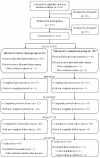A mobile phone application for the assessment and management of youth mental health problems in primary care: a randomised controlled trial
- PMID: 22123031
- PMCID: PMC3247177
- DOI: 10.1186/1471-2296-12-131
A mobile phone application for the assessment and management of youth mental health problems in primary care: a randomised controlled trial
Abstract
Background: Over 75% of mental health problems begin in adolescence and primary care has been identified as the target setting for mental health intervention by the World Health Organisation. The mobiletype program is a mental health assessment and management mobile phone application which monitors mood, stress, coping strategies, activities, eating, sleeping, exercise patterns, and alcohol and cannabis use at least daily, and transmits this information to general practitioners (GPs) via a secure website in summary format for medical review.
Methods: We conducted a randomised controlled trial in primary care to examine the mental health benefits of the mobiletype program. Patients aged 14 to 24 years were recruited from rural and metropolitan general practices. GPs identified and referred eligible participants (those with mild or more mental health concerns) who were randomly assigned to either the intervention group (where mood, stress, and daily activities were monitored) or the attention comparison group (where only daily activities were monitored). Both groups self-monitored for 2 to 4 weeks and reviewed the monitoring data with their GP. GPs, participants, and researchers were blind to group allocation at randomisation. Participants completed pre-, post-, and 6-week post-test measures of the Depression, Anxiety, Stress Scale and an Emotional Self Awareness (ESA) Scale.
Results: Of the 163 participants assessed for eligibility, 118 were randomised and 114 participants were included in analyses (intervention group n = 68, comparison group n = 46). Mixed model analyses revealed a significant group by time interaction on ESA with a medium size of effect suggesting that the mobiletype program significantly increases ESA compared to an attention comparison. There was no significant group by time interaction for depression, anxiety, or stress, but a medium to large significant main effect for time for each of these mental health measures. Post-hoc analyses suggested that participation in the RCT lead to enhanced GP mental health care at pre-test and improved mental health outcomes.
Conclusions: Monitoring mental health symptoms appears to increase ESA and implementing a mental health program in primary care and providing frequent reminders, clinical resources, and support to GPs substantially improved mental health outcomes for the sample as a whole.
Trial registration: ClinicalTrials.gov NCT00794222.
Figures




Similar articles
-
A mobile phone application for the assessment and management of youth mental health problems in primary care: health service outcomes from a randomised controlled trial of mobiletype.BMC Fam Pract. 2013 Jun 19;14:84. doi: 10.1186/1471-2296-14-84. BMC Fam Pract. 2013. PMID: 23782796 Free PMC article. Clinical Trial.
-
Self-monitoring using mobile phones in the early stages of adolescent depression: randomized controlled trial.J Med Internet Res. 2012 Jun 25;14(3):e67. doi: 10.2196/jmir.1858. J Med Internet Res. 2012. PMID: 22732135 Free PMC article. Clinical Trial.
-
Social recovery therapy for young people with emerging severe mental illness: the Prodigy RCT.Health Technol Assess. 2021 Nov;25(70):1-98. doi: 10.3310/hta25700. Health Technol Assess. 2021. PMID: 34842524 Clinical Trial.
-
Behavioural modification interventions for medically unexplained symptoms in primary care: systematic reviews and economic evaluation.Health Technol Assess. 2020 Sep;24(46):1-490. doi: 10.3310/hta24460. Health Technol Assess. 2020. PMID: 32975190 Free PMC article.
-
Systematic reviews of the effectiveness of day care for people with severe mental disorders: (1) acute day hospital versus admission; (2) vocational rehabilitation; (3) day hospital versus outpatient care.Health Technol Assess. 2001;5(21):1-75. doi: 10.3310/hta5210. Health Technol Assess. 2001. PMID: 11532238 Review.
Cited by
-
Transition Cliffs for Young Adults with Anxiety and Depression: Is Integrated Mental Health Care a Solution?J Behav Health Serv Res. 2020 Apr;47(2):275-292. doi: 10.1007/s11414-019-09670-8. J Behav Health Serv Res. 2020. PMID: 31428923 Free PMC article.
-
Recommendations for mobile apps for mental health treatment: Qualitative interviews with psychiatrists.Digit Health. 2025 Mar 17;11:20552076251325951. doi: 10.1177/20552076251325951. eCollection 2025 Jan-Dec. Digit Health. 2025. PMID: 40103639 Free PMC article.
-
Screening for Depression in Pediatric Primary Care.Curr Psychiatry Rep. 2018 Jul 23;20(8):62. doi: 10.1007/s11920-018-0926-7. Curr Psychiatry Rep. 2018. PMID: 30039275 Review.
-
The Comparative Effectiveness of Mobile Phone Interventions in Improving Health Outcomes: Meta-Analytic Review.JMIR Mhealth Uhealth. 2019 Apr 3;7(4):e11244. doi: 10.2196/11244. JMIR Mhealth Uhealth. 2019. PMID: 30942695 Free PMC article.
-
Prevention and early intervention of depression in young people: an integrated narrative review of affective awareness and Ecological Momentary Assessment.BMC Psychol. 2021 Aug 16;9(1):113. doi: 10.1186/s40359-021-00614-6. BMC Psychol. 2021. PMID: 34392830 Free PMC article. Review.
References
-
- WHO. Integrating mental health into primary care: a global perspective. Geneva: World Health Organization and World Organization of Family Doctors (Wonca); 2008.
-
- van Straten A, Seekles W, van't Veer-Tazelaar NJ, Beekman ATF, Cuijpers P. Stepped care for depression in primary care: what should be offered and how? Medical Journal of Australia. 2010;192(11 Suppl):S36–S39. - PubMed
-
- Hickie IB, Groom GL, McGorry PD, Davenport TA, Luscombe GM. Australian mental health reform: time for real outcomes. Medical Journal of Australia. 2005;182:401–406. - PubMed
Publication types
MeSH terms
Associated data
LinkOut - more resources
Full Text Sources
Other Literature Sources
Medical

